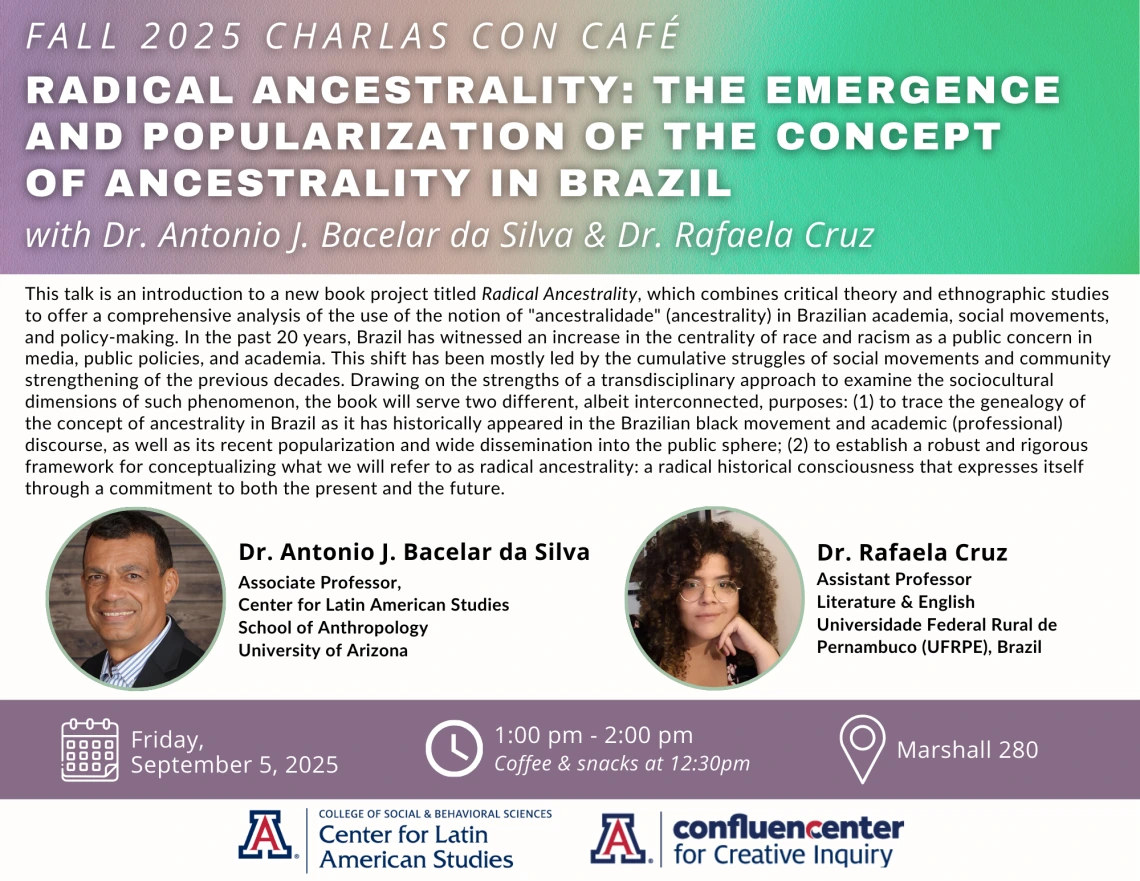
When
Where
The Center for Latin American Studies is partnering with the Confluencenter for Creative Inquiry this fall to host the Charlas con Café Speaker Series – a weekly space to hear lectures from a wide variety of experts and discuss topics relevant to the Latin American region, Fridays from 1-2 pm (unless otherwise specified).
Coffee & snacks at 12:30pm!
The talk will introduce the audience to our new book project Radical Ancestrality, which combines critical theory and ethnographic studies to offer a comprehensive analysis of the use of the notion of "ancestralidade" (ancestrality) in Brazilian academia, social movements, and policy-making. In the past 20 years, Brazil has witnessed an increase in the centrality of race and racism as a public concern in media, public policies, and academia. This shift has been mostly led by the cumulative struggles of social movements and community strengthening of the previous decades - the historical Brazilian Black movement, claiming reparation, recognition, and representation within the social sphere. This more recent trend has included the use of the term "ancestralidade" as a means to access a previously obscured historical background that helps define blackness and what it means to be black in Brazil, as well as to provide a basis upon which such belonging can be widely accessed by the community at large. Ancestralidade has become a common term in everyday life as well as in academic research. Every time one needs to access or validate a background or historical grounding to a communal existence, be it black or another racial/ethnic group, ancestralidade rises as a key concept. Therefore, investigating ancestralidade as an emerging concept can provide us with interesting clues to understanding the current state of racial relations in Brazil, particularly at a time when the population seems to be at a pivotal crossroads of racial reckoning. Drawing on the strengths of a transdisciplinary approach to examine the sociocultural dimensions of such phenomenon, the book will serve two different, albeit interconnected, purposes: (1) to trace the genealogy of the concept of ancestrality in Brazil as it has historically appeared in the Brazilian black movement and academic (professional) discourse, as well as its recent popularization and wide dissemination into the public sphere—largely extrapolating beyond the common constraints of both academic and activist discourse; (2) to establish a robust and rigorous framework for conceptualizing what we will refer to as radical ancestrality: a radical historical consciousness that expresses itself through a commitment to both the present and the future.
Antonio José Bacelar da Silva is Brazilian-born socio-cultural and linguistic anthropologist. He is currently serving as Associate Professor in both the Center for Latin American Studies and the School of Anthropology at the University of Arizona. His research explores the intersection of language, race and anti-racism, with a focus on Afro‑Brazilian identity, activism and discourse. He is the author of Between Brown and Black: Anti-Racist Activism in Brazil (2022, Rutgers University Press), Winner of the Sérgio Buarque de Holanda Prize for Best Book in Social Sciences, Brazil Section of the Latin American Studies Association.
Rafaela Cruz is a Brazilian-born Assistant Professor of Literature and English at the Universidade Federal Rural de Pernambuco (UFRPE), Brazil. She was a visiting researcher at the Center for Latin American Studies at the University of Arizona. Her research focuses on Critical Theory, Latin American decolonial thought, comparative literature, and the historical-philosophical dialectics of cultural forms.

